The Underground Atlantic Experience
Forty Years of the Rompente Collective (1975–1983)
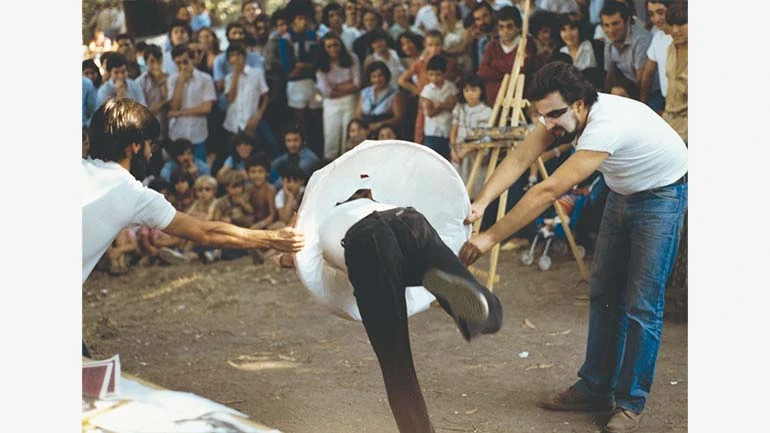
Held on 13 May 2022
Cando lle dis a un poeta,
“a túa voz fala por nós”
alégrase
pero moito máis se alegra se é
que falades por vós mesmos
— Silabario da turbina, 1978
Vigo, a place and a time of transition among many others following the mass strikes of 1972. A workers’ city still gasping under repression, with Franco dead and Humberto Baena murdered. A mutant, disjointed city whose “irrevocably maladjusted” children roam between strange books and even stranger sounds and chemical paradises. Dreams of revolution, desires for revolt, inquisitive lives. Gunpowder and magnolias. Hippies on the Cíes Islands, but there’s still Portugal. What is the avant-garde if not a cross on a map, on the skin of an era, certain forms that speak of a mode of inhabiting it, advancing on it, reluctantly, between collective reveries and new techniques? Something that is passed on, complicates, fades.
Through the paths leading from Marxism-Leninism and the fight for national liberation to pop culture — with or against post-modern banality, denying or desiring the local evolution of Madrid’s Movida cultural movement or, in its absence, an emancipated country — the experience of the Rompente collective is articulated. Fanzines, meetings, verses, performances, collages, concerts, video clips and vinyl records shape a sprawling poetic-political archive of cultural resistance. The dead, the forgotten, the triumphant and the next generation would pass before the cage of a monkey called Paco, who looked them over with great bewilderment from the Atlantic coast, in a 2010 documentary made by Piño Prego. As the decades pass, another myth is born, a memory, an inheritance. Until, finally, there is a revival.
Four decades on from the Rompente collective’s disbandment, this encounter is organised to reflect and work upon the historical significance of this community of artists, poets, musicians and likeminded figures, and upon the collective’s memory, forms of artistic production and political by-products. The activity also examines the articulations of the movement concerning related phenomena in the context of the post-Franco transition, on a regional and national level, that appeared and disappeared in the decades that followed. In the voices of leading figures and witnesses, and via the perspectives of younger poets, critics and researchers, a collective journey is set forth around the world of the Atlantic underground in the 1970s and 1980s, the echoes and forms of which still interrogate us from the seas of Vigo.
[dropdown]
Carlota Álvarez Basso (Vigo, 1964) was in charge of the Museo Reina Sofía’s Department of Audiovisual Artworks from 1992 to 1999 and, since 2018, has overseen the Special Projects from the Museo’s Sub-Directorate for Art.
Ángel Calvo Ulloa (Lalín, 1984) is an exhibition curator and art critic. He holds a degree in Art History from the University of Santiago Compostela and an MA in Contemporary Art from the University of Vigo. He has curated projects such as Complexo Colosso (Centro Internacional das Artes José de Guimarães - CIAJG, 2021) and Habitación. Archivo F.X. (Centro de Arte Dos de Mayo - CA2M, Museu Nacional d'Art de Catalunya - MNAC and La Nau, 2018–2019). Moreover, he has carried out projects for other institutions such as the Museo de Arte Contemporánea de Vigo (MARCO), the Centro de Cultura de España en México (CCEMX) and the La Tabacalera Self-Managed Social Centre in Lavapiés, Madrid. Together with Juan Canela, he has published Desde lo curatorial. Conversaciones, experiencias y afectos (Consonni, 2020).
Alba Cid (Ourense, 1989) is a poet and researcher from Galicia. Atlas (Galaxia, 2019), her first poetry collection, received the National Prize for Literature in the “Miguel Hernández” Youth Poetry section, awarded by Spain’s Ministry of Culture. Her poems have been translated into German, Spanish, Greek, English and Portuguese, and have also been included in digital magazines and publications such as Poem-a-Day, Asymptote, Enfermaria 6, Kenyon Review, Oculta Lit, The Offing and Words Without Borders. She is a contributor with Radio Galega and with an array of magazines, as well as being part of inter-artistic projects tied to immaterial heritage in aCentral Folque and a member on the editorial board of the magazine Dorna. She is an occasional photographer and illustrator, and explores etymologies, natural history and different cultural practices.
Manuel Jabois Sueiro (Pontevedra, 1978) is a journalist and writer. He started his career in journalism with Diario de Pontevedra, before moving on to El Mundo, and since 2015 has written reports, features and columns for El País. He also has a daily slot on the Cadena SER programme Hora 25. As a writer, he has published the collection of articles Irse a Madrid (Pepitas de Calabaza, 2011), the short memoirs Grupo Salvaje (Libros del K. O., 2012) and Manu (Pepitas de Calabaza, 2013), as well as a longer work on the 11M terrorist attacks entitled Nos vemos en esta vida o en la otra (Planeta, 2016). His book Malaherba (Alfaguara, 2019) sealed his standing as one of the most popular Spanish writers of his generation. Miss Marte (Alfaguara, 2021) is his latest novel.
Germán Labrador Méndez is the director of the Museo Reina Sofía’s Public Activities Department.
Menchu Lamas (Vigo, 1954) is an artist who has been a reference point in contemporary Spanish painting since bursting on the scene through exhibitions held in Galería Buades in Madrid and shows on the Atlantic movement. Her work is inherently emblematic with a personal iconography, characterised by chromatic intensity and a fusion of abstract and figurative techniques. Her works have been displayed at international shows that include the São Paulo Biennial, Europalia in Brussels, Five Spanish Artists in New York, Caleidoscopio Español in Dortmund, Spansk-Egen-Art in Stockholm, Currents at The Institute of Contemporary Art (ICA), Boston, and Art d´Aujourdhui-Art de Femmes, in Vienna. She has also exhibited at galleries in Munich, Hamburg, Stuttgart, Paris and Milan. The Museo de Arte Contemporáneo de Castilla y León (MUSAC) is currently putting together a broad monographic exhibition on her work, curated by Chus Martínez.
Roberto Oliveira Ogando (Salceda de Caselas, 1979) specialises in contemporary percussion. He earned a degree at the Koninklijk Conservatorium in The Hague, Netherlands, and holds an MA in Music Performance with First Class Honours from the Royal Irish Academy of Music in Ireland. He is also a PhD student at the University of Santiago de Compostela, writing the thesis Procesos estructurales electroacústicos (Structural Electroacoustic Processes) on Enrique X. Macías. He is the co-founder of ONME Gestión Cultural S. L. and is currently a member of the Organistrum group at the University of Santiago de Compostela and a collaborating researcher at the Centro de Estudos de Sociologia e Estética Musical (CESEM) from the Faculdade de Ciências Sociais e Humanas at the Universidade Nova de Lisboa.
Alicia Pajón Fernández (Lugo, 1993) holds a degree in Music History and Science from the University of Oviedo and is a PhD student at the same university. Her thesis analyses discourses around music in Spanish newspapers during the Transition to democracy. She is part of the Grupo de Investigación en Música Contemporánea de España y Latinoamérica Diapente XXI.
Antón Reixa (Vigo, 1957) holds a degree in Galician Studies and has been an active part of the poetry world since the end of the 1970s with the Grupo de Comunicación Poética Rompente. He has published numerous poetry collections, including Ringo Rango (Xerais, 1992), Algo Raro Pasa Raro (Oficina de Arte y Ediciones, 2015) and Outlet (Chan da Pólvora, 2020). His prose most notably includes Transporte de Superficie (Edicións Positivas, 1991) and Michigan/Acaso Michigan (Xerais, 2018). A singer and lyricist in Os Resentidos and Nación Reixa, his lyrics are compiled in the book Viva Galicia Beibe (Xerais, 2016). As an audiovisual producer and director, the series Mareas Vivas (1998–2002) and the film El Lápiz del Carpintero (2002) stand out. In theatre, Melancoholemia. Vida de Mamarracho (Kalandraka, 2020) is his most recent text, and he performs in the monologue version. In 2021, he was awarded the Gold Medal of Merit in the Fine Arts by the Spanish Government.
Alberte Valverde (Baiona, 1977) is a secondary education teacher at IES Indalecio Pérez Tizón de Tui. He holds a degree in Galician Studies and Portuguese Studies from the University of Santiago de Compostela and a PhD in Philology and Cultural Identity from the University of Vigo. His PhD thesis was centred on the Rompente collective and avant-garde discourses in Galician literature, while his research work focuses on the field of Galician and Portuguese literature over the past forty years, particularly in the respective transitions from dictatorships to democracy and from a socio-literary perspective. In parallel, he writes literature reviews in specialist magazines such as Grial and Kamchatka. At the current time, he contributes to the José Saramago Chair at the University of Vigo.
[/dropdown]
Programme
Friday, 13 May 2022
4:30pm Presentation
—Conducted by Germán Labrador Méndez
5:15pm Table 1. Galletas Rompente (1975–1983): Memory-Moment-Movement
Participants:
Ángel Calvo Ulloa. Dirty Hands. The Old Through the New
Menchu Lamas. Creative Laughs
Manuel Jabois Sueiro. Some Notes on Rompente
Antón Reixa. The Poetic Rear-view Mirror of the Years
— Moderated by: Carlota Álvarez Basso
6:15pm Break
6:30pm Que hostia din os rumorosos? (selection). Recitation
—Conducted by Antón Reixa
6:45pm Break
7pm Table 2. Facer pulgarcitos hoxe: Aesthetics and Politics in the 1970s
Participants:
Alicia Pajón Fernández. Vigo, Lisbon Capital? Music, Politics and the Underground in the Transition
Roberto Oliveira Ogando. The Electroacoustic Works of Enrique X. Macías in Context (1977–1979)
Alba Cid. A dama que fala é un galimatías: Rompente, Sketching a Vanguardist Poetic Genealogy
Alberte Valverde. Fóra as vosas sucias mans de Rompente
Organised by
Museo Reina Sofía
Inside the framework of
Educational program developed with the sponsorship of

Participants
Participants
Más actividades

Difficulty. Forms and Political Effects of Deviation in Writing and Contemporary Art
23 February – 14 December 2026 – Check programme
Difficulty. Forms and Political Effects of Deviation in Writing and Contemporary Art is a study group aligned towards thinking about how certain contemporary artistic and cultural practices resist the referentiality that dominates the logics of production and the consumption of present-day art. At the centre of this proposal are the concepts of difficulty and deviation, under which it brings together any procedure capable of preventing artistic forms from being absorbed by a meaning that appears previous to and independent from its expression. By ensuring the perceptibility of their languages, difficulty invites us to think of meaning as the effect of a signifying tension; that is, as a productive and creative activity which, from the materiality of art objects, frees aesthetic experience from the representational mandate and those who participate in it from the passiveness associated with tasks of mimesis and decoding.
The economy of the referential norm translates the social logic of capitalism, where insidious forms of capturing subjectivity and meaning operate. In the early 1980s, and adopting a Marxist framework, poet Ron Silliman highlighted how this logic entailed separating language from any mark, gesture, script, form or syntax that might link it to the conditions of its production, rendering it fetichised (as if without a subject) and alienating its users in a use for which they are not responsible. This double dispossession encodes the political strategy of referential objectivity: with no subject and no trace of its own consistency, language is merely an object, that reality in which it disappears.
The political uses of referentiality, more sophisticated today than ever before, sustain the neoliberal-extractivist phase of capitalism that crosses through present-day societies politically, economically and aesthetically. Against them, fugitive artistic practices emerge which, drawing from Black and Queer studies and other subaltern critical positions, reject the objective limits of what exists, invent forms to name what lies outside what has already been named, and return to subjects the capacity to participate in processes of emission and interpretation.
Read from the standpoint of artistic work, the objective capture of referentiality may be called transparency. Viewed from a social contract that reproduces inequality in fixed identity positions, transparent in this objectivity are, precisely, the discourses that maintain the status quo of domination. Opposite the inferno of these discourses, this group aims to collectively explore, through deviant or fugitive works, the paradise of language that Monique Wittig encountered in the estranged practices of literature. For the political potency of difficulty — that is, its contribution to the utopia of a free language among equals — depends on making visible, first, its own deviations; from there, the norm that those deviations transgress; and finally, the narrowness of a norm which in no way exhausts the possibilities ofsaying, signifying, referring and producing a world.
From this denouncement of referential alienation, fetishisation and capture, Difficulty. Forms and Political Effects of Deviation in Writing and Contemporary Art turns its attention to the strategies of resistance deployed by contemporary artists and poets. Its interest is directed towards proposals as evidently difficult or evasive as those of Gertrude Stein, Lyn Hejinian, Theresa Hak Kyung Cha, Kameelah Janan Rasheed, Kathy Acker, María Salgado and Ricardo Carreira, and as seemingly simple as those of Fernanda Laguna, Felix Gonzalez Torres and Cecilia Vicuña, among other examples that can be added according to the desires and dynamics of the group.
The ten study group sessions, held between February and December, combine theoretical seminars, work with artworks from the Museo Reina Sofía’s Collections and exhibitions, reading workshops and public programs. All these formats serve as spaces of encounter to think commonly about certain problems of poetics — that is, certain political questions — of contemporary writing and art.
Difficulty. Forms and Political Effects of Deviation in Writing and Contemporary Art inaugurates the research line Goodbye, Representation, through which the Museo Reina Sofía’s Studies Directorship seeks to explore the emergence of contemporary artistic and cultural practices which move away from representation as a dominant aesthetic-political strategy and redirect their attention toward artistic languages that question the tendency to point, name and fix, advocating instead for fugitive aesthetics. Over its three-year duration, this research line materializes in study groups, seminars, screenings and other forms of public programming.

CLINIC 2628. A Community of Writing and Research in the Arts
February – October 2026
Clinic 2628 is a project which supports and brings together writings which stem from the intention to offer a space and sustainable time for research work in art and culture. Framed within an academic context which is increasingly less receptive to the forms in which thinking happens and is expressed, the aim is to rescue the academic from its neoliberal trappings and thus recover the alliance between precision and intuition, work and desire. A further goal is to return writing to a commons which makes this possible through the monitoring of processes and the collectivisation of ideas, stances, references and strategies.
The endeavour, rooted in a collaboration between the Museo Reina Sofía’s Studies Directorship and the Artea research group, via the i+D Experimenta project, is shaped by three annual editions conceived as spaces of experimentation, discussion and a demonstration of writings critical of what is put forward by today’s academia.
What forces, forms and processes are at play when writing about art and aesthetics? In academia, in museums and in other cultural institutions, the practice of writing is traversed by productivist logics which jeopardise rhythms of research and experimentation. The imposition of both scientism inherent in the structure of “the paper” and the quantifying of results which demand a criterion of quality and visibility sterilise and smoothen, from the outset, the coarseness that is particular to writing understood from the concrete part of language: phonic, graphic, syntactic and grammatical resistance connecting the language user to the community the language unites and activates. They also sterilise the roughness enmeshed in the same desire to write, the intuitive, clear and confusing pathways that once again connect the writer to those reading and writing, participating in a common good that is at once discovered and produced.
The progressive commercialisation of knowledge propelled by cognitive capitalism moves further away from the research and production of knowledge in artworks and artistic languages and practices. The work of curators and archive, criticism, performances and essays formerly saw a horizon of formal and emotional possibilities, of imagination that was much broader when not developed in circumstances of competition, indexing and impact. Today, would it be possible to regain, critically not nostalgically, these ways; namely, recovering by forms, and by written forms, the proximity between art thinking and its objects? How to write in another way, to another rhythm, with no more demands than those with which an artwork moves towards different ways of seeing, reading and being in the world?

Cultural Work
Thursday, 12 February 2026 – 5:30pm
This series is organised by equipoMotor, a group of teenagers, young people and older people who have participated in the Museo Reina Sofía’s previous community education projects, and is structured around four themed blocks that pivot on the monstrous.
Session number two looks to approach film as a place from which cultural work is made visible and processes of production engage in dialogue with artistic creation. From this premise, the session focuses on exploring how audiovisual content is produced, assembled and distributed, from the hands that handle the images to the bodies that participate in its circulation. The aim is to reflect on the invisible effort, precarity and forms of collaboration that uphold cultural life, that transform the filmic experience into an act that recognises and cares for common work.
![Basel Abbas y Ruanne Abou-Rahme, At Those Terrifying Frontiers Where the Existence and Disappearance of People Fade Into Each Other [En esas fronteras aterradoras donde la existencia y la desaparición de personas se disuelven entre sí], 2019](https://recursos.museoreinasofia.es/styles/small_landscape/public/Colecci%C3%B3n/abbasabourahme.png.webp)
Gaza and Aestheticide
Tuesday February 10, 2026 – 16:00 h
This seminar examines the systematic destruction of Palestinian collective sensibility — what we might call “aestheticide” — that has accompanied Israel’s genocide and ecocide in Gaza, and considers the conditions of artistic practice in its aftermath. Over more than two years, the demolition of universities, archives, museums, and libraries has not only erased cultural and intellectual infrastructure but has also targeted the very possibility of representation itself. The destruction of a people has been accompanied by the destruction of their image, their history, and their capacity to be known: reportage, scholarship, and cultural memory have been deliberately undermined, with media institutions, universities, and museums often complicit in this repression. Gaza consequently functions as a rehearsal space for a possible global future — of fascism, post-liberal authoritarianism, militarized borders, and AI-enabled warfare —, a laboratory for an emerging world order. What, then, becomes of critical analysis and resistance under these conditions? And what becomes of aesthetics and politics?
This three-hour seminar engages in dialogue with a broader line of work on the climate emergency and decolonial perspectives developed within the Museum of the Commons project (2023–2026) of the L’Internationale network, of which the Museo Reina Sofía is a member; as well as with some of the questions that animate the study group Aesthetics of Peace and Desertion Tactics. Finally, it is also embedded in a wider strategy of support for and commitment to the artistic and discursive practices of Palestinian artists and cultural practitioners, most clearly reflected in the TEJA network.
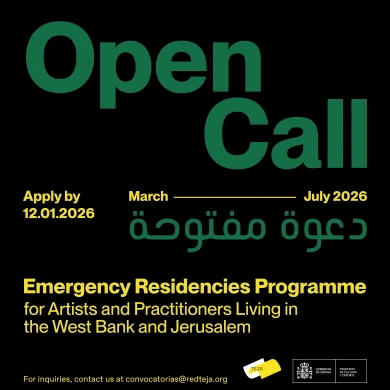
TEJA 2026. Open Call for Emergency Art Residencies
Proposal submission until 12 January, 2026
TEJA / Red de espacios culturales en apoyo a situaciones de emergencia [Network of Cultural Spaces in Support of Emergency Situations] has the mission to promote transnational cooperation by offering temporary art residencies to artists and cultural practitioners who find themselves in complex socio-political situations in their countries of origin. During their stay in Spain, residents receive accommodation, legal and psychological counseling, and access to a network of organizations and professionals with whom they can share, develop, and continue with their creative projects. The goal is to provide a safe and stimulating environment where artists can continue their work despite adverse circumstances and generate dialogue spaces that ensure freedom of expression through joint activities both in Spain and with international collaborators.
During 2026, TEJA hosts three new residencies, each lasting three months, dedicated to supporting artists and cultural practitioners residing in the West Bank and Jerusalem. In addition, in the second half of the year, TEJA hosts three additional residencies for Gazan artists, which are offered by invitation (as Spain is currently unable to facilitate evacuations from Gaza, these invitations are coordinated through France). These residencies aim to provide a stable, creative environment and foster artistic exchange in the face of ongoing adversities. Through this new program, TEJA reaffirms its commitment to amplifying Palestinian voices and empowering artists as they navigate these turbulent times.
The selection is carried out by the TEJA network in close collaboration with each hosting partner. This year the hosting partners are: La Escocesa (Barcelona), hablarenarte / Planta Alta (Madrid), Espositivo (Madrid), Institute for Postnatural Studies (Madrid), Casa Árabe (Córdoba). The selection prioritizes the artist’s personal and professional situation first, and then the alignment with the practices and themes of the hosting spaces. Proposal submission deadline is January 12th, 2026, 23:59 h.

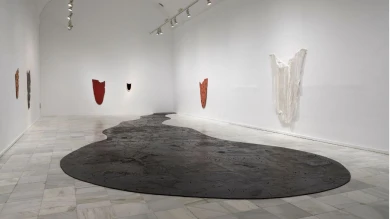
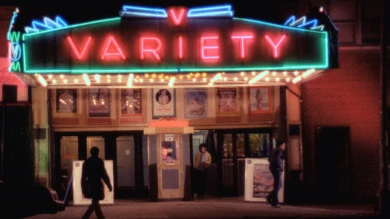
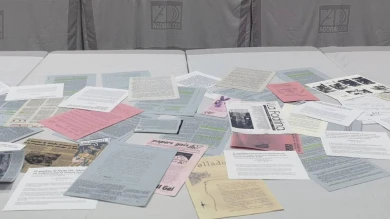
![Miguel Brieva, ilustración de la novela infantil Manuela y los Cakirukos (Reservoir Books, 2022) [izquierda] y Cibeles no conduzcas, 2023 [derecha]. Cortesía del artista](https://recursos.museoreinasofia.es/styles/small_landscape/public/Actividades/ecologias_del_deseo_utopico.jpg.webp)
![Ángel Alonso, Charbon [Carbón], 1964. Museo Reina Sofía](https://recursos.museoreinasofia.es/styles/small_landscape/public/Actividades/perspectivas_ecoambientales.jpg.webp)